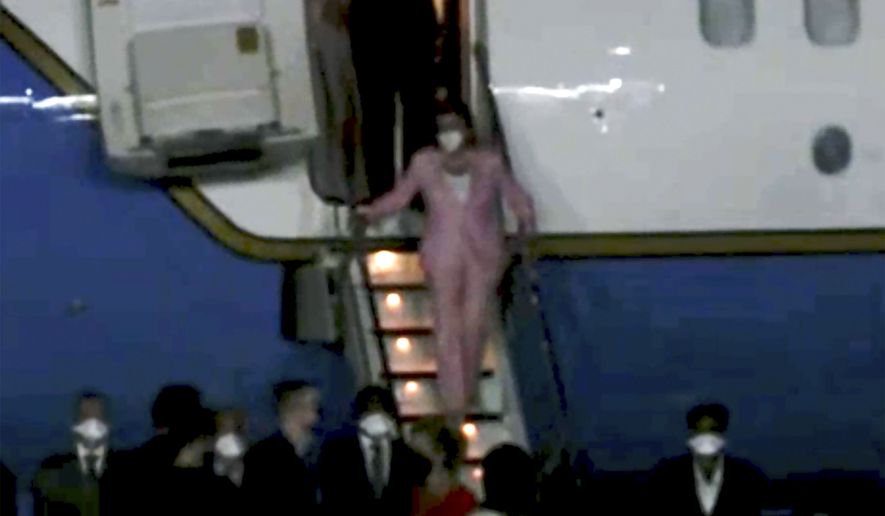The White House on Tuesday said it expects China to “continue to react over a longer-term horizon” over House Speaker Nancy Pelosi’s visit to Taiwan, signaling that the high-profile stopover could cast a far-reaching shadow over already tense U.S.-China relations for the foreseeable future.
Minutes after Mrs. Pelosi, who is leading a delegation of five other House Democrats through Asia, arrived in Taipei, Chinese officials responded with forceful remarks condemning the visit.
Mrs. Pelosi is the highest ranking U.S. official to visit the self-governing island just over 100 miles off mainland China since Speaker Newt Gingrich, a Republican, made the visit more than two decades ago. Her landing in Taipei late Tuesday capped weeks of intense speculation surrounding her expected stopover despite blunt warnings from Beijing against the trip.
China’s foreign minister condemned the visit and officials in Beijing also announced on Tuesday that they would immediately conduct “a series of joint military operations around the Taiwan Island,” including live-fire drills in the Taiwan Strait.
National Security Council spokesman John Kirby told reporters that Beijing’s response is “exactly in line with what we anticipated,” and that he expects tensions to remain high in the region after the lawmakers depart.
“I couldn’t give you a date certain of what that horizon looks like, but we certainly would expect them to react even beyond her trip, including announcing additional large-scale fire exercises,” Mr. Kirby told reporters Tuesday.
Beijing claims Taiwan as part of China and thus its own territory. The government in Taipei, which formally calls itself the Republic of China, is denounced as an illegitimate renegade.
Mr. Biden acknowledged last month that U.S. military leaders viewed the Taiwan trip as too provocative. “The military thinks it’s not a good idea right now,” Mr. Biden said on July 21.
The White House has since refrained from commenting on the trip, noting that the speaker, a longtime critic of China and its human rights record, is not part of the executive branch and makes her own travel decisions. Mr. Kirby and others said her trip should not be seen as a change in official U.S. policy on Taiwan.
The administration has continued to underscore the U.S. commitment to the “One China” policy, a diplomatic recognition of the People’s Republic of China in Beijing as the sole government of all “China.” The term includes the island of Taiwan.
Mr. Kirby reiterated on Tuesday the administration’s stance that the travel is consistent with “longstanding U.S. policy.”
He said there is no reason for Beijing to turn the visit into “some sort of crisis, or use it as a pretext to increase aggressiveness and military activity in or around the Taiwan Strait.”
SEE ALSO: Pelosi visits Taiwan as U.S.-China tensions escalate
“The United States will not see and does not want a crisis,” he said. “We are prepared to manage what Beijing chooses to do.”
• Joseph Clark can be reached at jclark@washingtontimes.com.




Please read our comment policy before commenting.